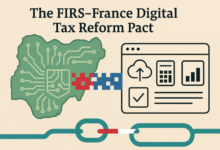Lagos Advances Digital Future with 2nd Phase of 3,300km Metro Fibre Rollout

In a bold move to deepen its digital transformation agenda, the Lagos State Government has kicked off the second phase of its 3,300km metro fibre project — a massive infrastructure backbone expected to revolutionise internet connectivity, public service delivery and urban safety across the state.
The digital initiative, announced by Mr. Olatunbosun Alake, Commissioner for Innovation, Science and Technology (LAMIST), during the 2025 Ministerial Press Briefing in Lagos, marks a strategic continuation of the earlier 2,700km phase. Together, both phases aim to build the largest metro fibre network ever undertaken by a sub-national government in Africa.
Laying the Digital Tracks for Smart Governance
This fibre-optic expansion is not just a technological feat — it represents a paradigm shift in governance, positioning Lagos as a digitally responsive and globally competitive mega-city. According to Alake, the first phase of the project catalysed over one million new internet subscriptions between 2023 and 2025, while also enabling telecoms giants to extend their services into underserved communities.
With digital infrastructure now acknowledged as a key economic enabler, this project opens new opportunities for e-governance, digital entrepreneurship, and tech-driven job creation — critical pillars for Lagos’ aspiration to become Africa’s Silicon Valley.
Safe City, Smarter Lagos
In tandem with the fibre rollout, the Safe City Project — a collaboration between LAMIST and the Ministry of Transportation — is leveraging Intelligent Transport Systems (ITS) to enforce traffic compliance and enhance urban security. Surveillance infrastructure including automatic number plate recognition (ANPR) and intelligent video cameras are already active in hotspots such as Alapere and Allen Avenue, signalling a shift from reactive to predictive policing.
This data-driven approach reflects Lagos’ broader ambition of becoming a “smart city,” where real-time insights can shape policy, prevent crime, and streamline urban operations.
Building a Digitally Capable Civil Service
At the institutional level, the state government is rolling out an Enterprise Architecture blueprint that aims to digitise the operations of 40 ministries, departments, and agencies (MDAs). The backbone of this framework is an Oracle ERP platform for finance and treasury management — a move designed to boost transparency, improve budget tracking, and eliminate leakages.
Further strengthening citizen engagement, LAMIST has launched an integrated digital services portal offering access to key services in advertising, agriculture, education, and physical planning, among others.
AI Governance on the Horizon
Looking ahead, Lagos is preparing for the future of tech with a planned release of Artificial Intelligence (AI) governance guidelines — a pioneering regulatory move in the Nigerian public sector. The proposed framework will mandate self-assessment protocols for AI developers, ensuring adherence to ethical standards such as data protection, fairness, and algorithmic transparency.
Alake revealed that AI tools — beginning with chatbots — will be integrated into public-facing platforms to enhance service delivery and citizen feedback loops. A dedicated Research and Development Council will also be created to drive local innovation in emerging tech fields, including AI, machine learning, and blockchain.
Strategic Vision and Implications
LAMIST’s aggressive digitisation push comes at a time when digital economies are reshaping global GDP patterns. By prioritising broadband infrastructure, process automation, and AI governance, Lagos is not only catching up with global digital trends — it is aiming to set the pace in Africa.
For investors, this signals increasing market potential in ICT, digital infrastructure, fintech, and e-government solutions. For citizens, it means more accessible, responsive, and secure public services. For businesses, it unlocks new markets and efficiencies.
As BRANDECONOMY observes, the success of this ambitious rollout could make Lagos the benchmark for digital governance in Africa — and a prime example of how public policy, innovation, and infrastructure can converge to drive inclusive development.
Editor’s Note: LAMIST’s mission is anchored on deploying science and technology to elevate quality of life and governance standards in Lagos, with the ultimate vision of transforming the state into a global model for innovation and tech-driven growth.










